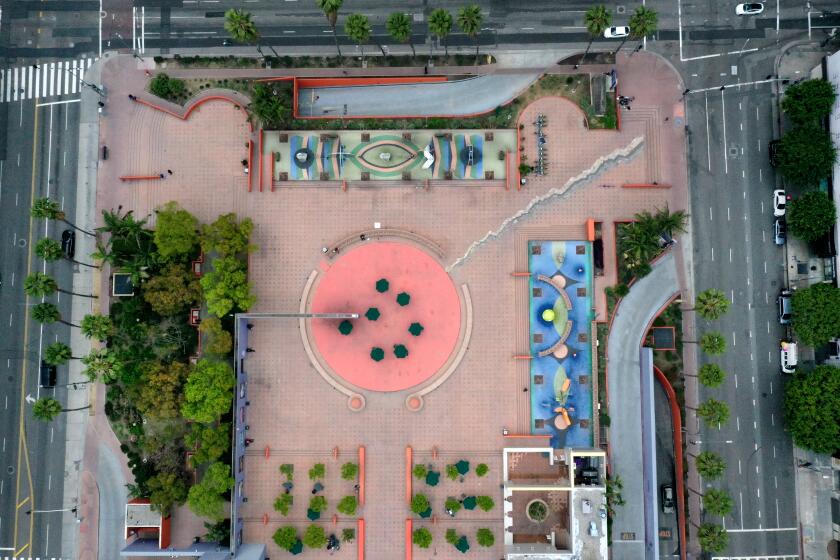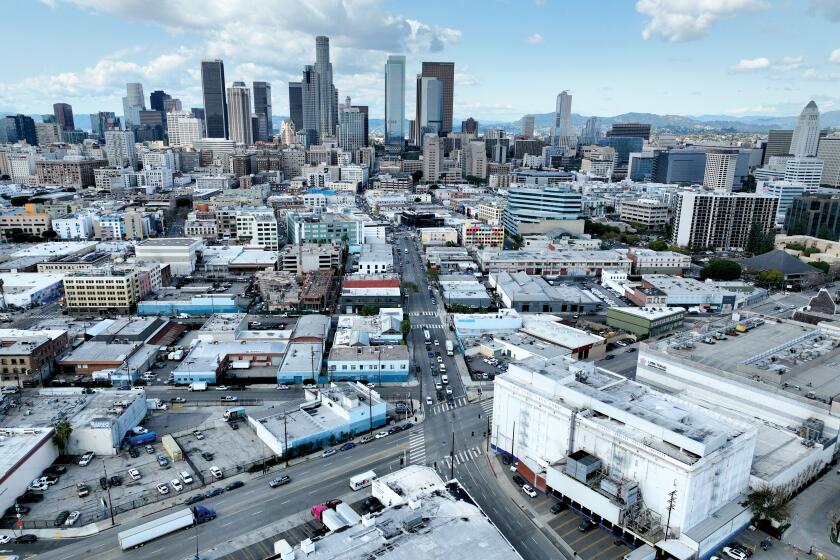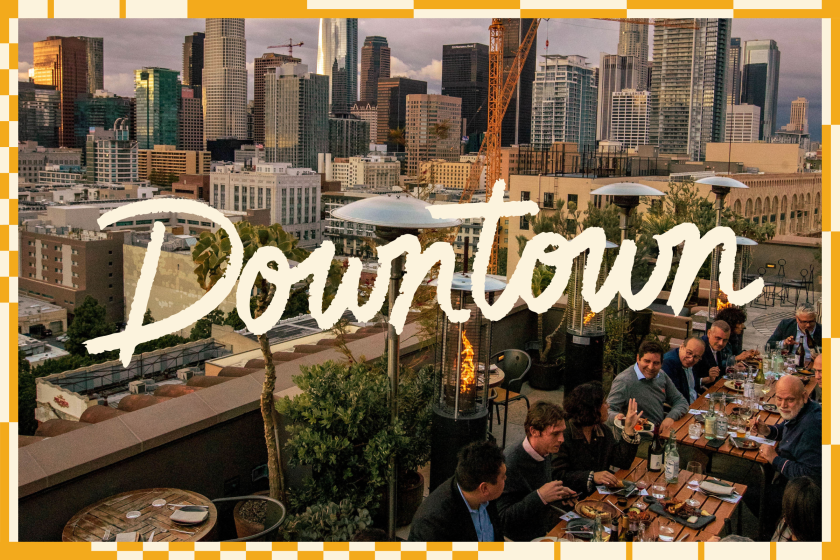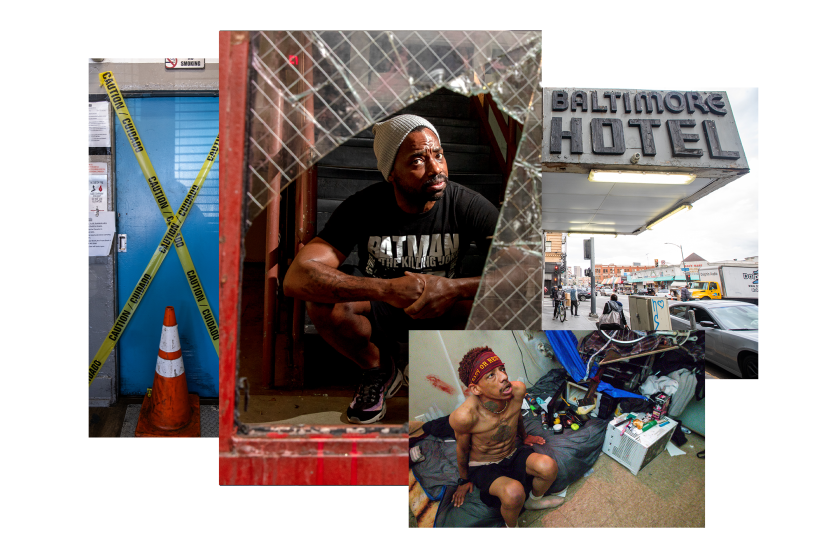L.A.’s Pershing Square is getting another makeover. Will this time finally be the charm?
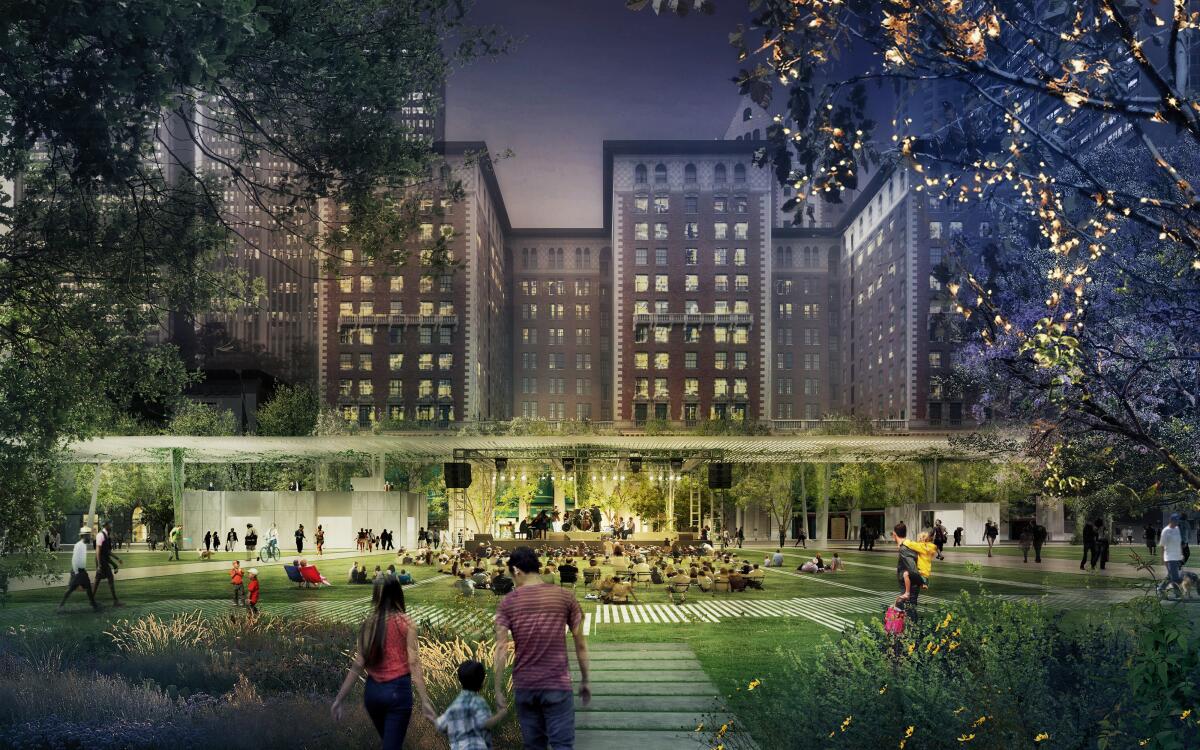
- Share via
Thirty years ago, I wrote a front-page article for The Times about what was then the latest redesign of Pershing Square, the much-reworked park perched above an underground parking garage in the center of downtown L.A. There was much rhetoric about how this $14.6 million city-sponsored face-lift — which was heavy on concrete paving and structures such as a purple 10-story bell tower and giant pink cylinder barriers — would revitalize the five-acre park and the surrounding neighborhoods. At the opening ceremony, then-Los Angeles Mayor Richard Riordan called the redo “a breath of fresh air, a vision of hope.”
Not everyone agreed — I had my doubts too. Soon enough, the naysayers were shown to be right. That renovation, designed by Mexican architect Ricardo Legorreta and landscape architect Laurie Olin, had many artsy touches such as an urban waterfall and a faux seismic fault. But overall, it proved to be alienating. There was little grass and shade and not enough places to comfortably sit (probably to discourage the homeless population from settling in). Access to the park already was difficult because of garage ramps; the new walls and stairways further cut off connection to adjacent streets.
The groundbreaking comes after nearly a decade of planning and development for the park, a mostly concrete space that was once a lush city center.
Although a winter ice-skating rink and movie nights were popular, the park wasn’t much used except by the homeless population. That was a sad outcome given the square’s history since 1866 as a city hub.
Now the city is taking the first steps to right its mistake. Bulldozers are at work on yet another makeover of Pershing Square, which fills the block enclosed by 5th, 6th, Hill and Olive streets.
Recognizing the obvious flop of Legorreta’s plan, a civic group sponsored a redesign contest. The winner, announced in 2016, was the French firm Agence Ter. Its submission called for “radical flatness,” pushing down the garage roof and lowering the entire park to street level, with much more greenery.
Then political, financial and technical problems delayed action. The city eventually hired a local architecture firm, Gruen Associates, to work with Agence Ter on bringing a doable version of the concept to reality, keeping as is more of the 1951 garage. The tweaked motto became “radical openness.”
A $2-billion residential and commercial development in Skid Row near the Arts District received a boost from Gov. Gavin Newsom on Thursday as his office fast-tracked its possible construction.
This latest plan takes down walls, lowers many elevations and makes the park more visible and accessible. It replaces pavement with lawns and shade trees and the often-broken escalators to the garage with new glass elevators.
The purple tower, pink cylinders and other brightly colored structures will be demolished (hooray!). A cafe and pergola will go in at street level along Olive Street across from the Biltmore Hotel.
During a recent tour of the work site, I watched as the Olive Street frontage was excavated and being lowered by about five feet. The plan calls for the work to be done in stages while some parts of the park remain open. It seems very promising.
Yet, it won’t come quickly or cheaply and is unlikely to be complete for the 2028 Olympics, the original goal. For the first yearlong phase, $21.6 million has been appropriated, mainly from city development fees. Estimates call for another $40 million — still not funded — for subsequent work over the next three years or so. Then, the final task would, among other things, reconfigure and shorten the long garage ramps that isolate the park and frighten pedestrians; that could cost another $100 million and it is uncertain whether the city will spend that.
Surviving multiple eras of ups and downs, DTLA remains a neighborhood in constant transformation — and a place that never stops dreaming.
I hope that all gets done, eventually. However, my personal alarm bell is ringing again. The new design is lovely and the phased process looks workable. My worries are more about what’s happening around Pershing Square and throughout downtown Los Angeles — and in many downtowns across the nation.
After decades of revival, downtowns are struggling. Since the pandemic, many workers aren’t returning to office buildings and some businesses that didn’t survive the shutdown remain shuttered. In L.A., office vacancies and abandoned housing projects, along with the large homeless population and a revived fear of crime, have hurt formerly vibrant parts of downtown.
All the worthy work on the park might be at risk if surrounding neighborhoods are not busy enough to keep Pershing Square active and safe. And a flatter, greener, more welcoming and accessible Pershing Square won’t by itself solve those bigger urban problems.
A gloomy outcome is not a certainty, of course. An estimated 14,000 people live within a half-mile walk of the park. Advocates for downtown development predict that a much larger population will reside in the area in a few years as offices convert into apartments and new buildings go up. Those residents, bolstered by tourists drawn to places such as Disney Hall, L.A. Live and the Arts District, could also keep a restored Pershing Square vibrant and well-used. The redone park, they say, is a good investment.
Recently, The Times has been investigating Skid Row’s troubled housing providers, digging into the failures of nonprofits such as AIDS Healthcare Foundation.
Over much of its history, Pershing Square has held a central role in L.A. life. Originally it was a lushly landscaped civic gathering spot for bandstand music in a dusty frontier town. (Pickpockets also loved it from the start.) In the early 20th century, it became ground zero for leftists and antiwar activists to test the limits of free speech — a heritage that continues when today’s protest marches begin or end there. Later, the park became a cruising area for gay men, and a spot where immigrant workers rested after shifts in the nearby garment and jewelry districts and lawyers and secretaries took coffee breaks. A 1931 history of the park describes visitors on benches, feeding “arrogant pigeons,” arguing about politics and “enjoying the play of the sun through tropical trees.”
If completed by next year, the makeover’s first phase along Olive Street will take down walls and oppressive structures and create a much-improved portion of the park there. It could become a popular street-level gathering place, a sort of front porch for the Biltmore Hotel across the way, and provide a glimpse of what the full redesign promises.
And maybe former Mayor Riordan’s wildly unfulfilled forecast from 30 years ago can finally come true: a downtown square that’s a “breath of fresh air, a vision of hope.” Maybe it will even help spark another downtown revival.
Whatever happens, at least those terrible pink cylinders from 1994 will be gone.
Larry Gordon is a former staff writer for the Los Angeles Times and EdSource, and co-author of “Stairway Walks in Los Angeles.”
More to Read
A cure for the common opinion
Get thought-provoking perspectives with our weekly newsletter.
You may occasionally receive promotional content from the Los Angeles Times.
